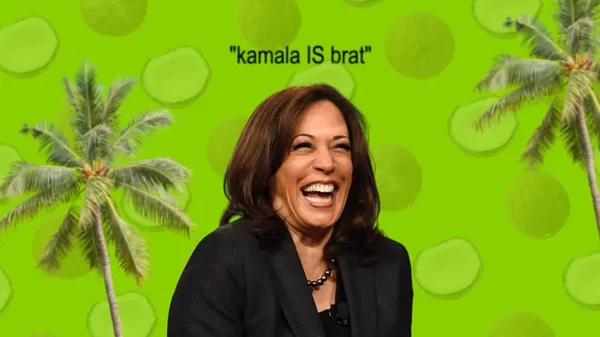!khive Take the  pill
pill 
I remember the moment I knew that Kamala Harris was not the candidate for me in the 2020 presidential race. It was just a few days before the second Democratic primary debate, and college student debt had become an issue on the campaign trail. Senators Bernie Sanders and Elizabeth Warren were promising large-scale, no-strings-attached relief to borrowers.
On July 26, 2019, Harris announced her student loan forgiveness program. I rolled my eyes when I saw the details. It was the kind of overworked, technocratic, means-tested policy I associated with milquetoast Democratic triangulators: $20,000 in relief if you were poor enough in college to be eligible for a Pell Grant and then went on to start a business in an economically disadvantaged community and kept it afloat for at least three years. Hardly anyone would qualify. These kinds of small-ball policies were never going to defeat the faux-populist juggernaut of Donald Trump.
My skepticism about Harris surprised me at the time, because her background is a lot like mine: an ambitious biracial, bicultural Black woman of a certain age in a highly competitive line of work that historically hasn't been welcoming to people who look like us. I admired her accomplishments. I had no doubt I would enjoy having a cocktail with her. But as a candidate, she just didn't impress me, and if I had strong feelings about Joe Biden choosing her as his running mate, I have long since forgotten them.
And so it has taken me quite by surprise to find that I have become coconut-pilled. That's the new nomenclature for converts to the Harris 2024 fold — a phrase that comes from her mother, and that I'll dig into later. But I want to be candid about something first: I'm a little embarrassed to be rooting for any politician.
I have always voted, but like most journ*lists, I have tried to keep my political views mostly to myself. I'm not a joiner of causes. I'm a reporter, for most of my career a foreign correspondent, and my orientation toward those in power (as much from personal inclination as professional habit) has always been skeptical if not outright antagonistic. And yet on the morning after the disastrous June debate between Biden and Trump, I wrote with enthusiasm that I believed Harris should take over at the top of the ticket and very much could beat Trump.
Why did I come around to Harris, and why so quickly? A lot of people are now asking themselves how they feel about Harris and whether she can do the job — all understandable questions after five years when many people were meh, at best, on her. The flash flood of endorsements, donations and support for Harris has been astonishing. Be it because of relief that Biden bowed out or fear of Trump's momentum after the assassination attempt and the Republican convention, there has been a consolidation around Harris that few expected.
I think you can trace the beginning of the vibe shift to Biden's terrible debate and Harris's interview with CNN's Anderson Cooper shortly afterward, when she crisply defended Biden and made an energetic case against Trump. No one interview or moment would win me over, but it did make a strong impression: that Harris had been significantly underrated, that the chatter about her flaws for the past four years maybe didn't tell her full story and that she had some unique talents and traits that made her a stronger candidate than her record might suggest.
Many political journ*lists were much more dubious about Harris's chances against Trump. Cable pundits were spinning elaborate fantasies of mini-primaries and bake-offs with celebrity judges to decide the Democratic nomination. I wondered if I had been too credulous after the debate to see the potential in Harris. But it didn't take long for my view to become the consensus among a lot of Americans.
With many of us evolving on Harris, I have wondered how Harris herself has evolved since she flopped in the 2020 Democratic primary contest. Has anything changed about her that has made Americans more open or enthusiastic about her, after years of bad headlines and disappointing public performances?
Americans have been through a lot since early 2020 — a pandemic, Jan. 6, a turbulent economy and high inflation, the invasion of Ukraine, the slaughter in Israel and Gaza and the never-ending 2024 presidential race. I also wondered if the Trump-Biden era changed what we want from a president. We are a frustrated, exhausted and divided nation. Most Americans believe we are on the wrong track, and we spent the past 20 months staring at a grim choice between Biden and Trump, the two men whose presidencies sent us down that track. Many of us are hungry for something new.
Sign up for the Opinion Today newsletter Get expert analysis of the news and a guide to the big ideas shaping the world every weekday morning. Get it sent to your inbox.
Looking anew at Harris, I see something different from what I once did: a person who stumbled as a candidate and vice president but who kept fighting anyway. I see a woman who struggled to compete for power against her peers, buried under an array of vague and unstated expectations about whether she gave the right answers, had the right ideas, was smart or specific enough. Like any woman of ambition, I deeply relate to these experiences. As strange as it might seem, I have come to think these experiences could make her the ideal candidate in a surreal campaign against a man who is so certain of himself, who admits to no mistakes, who has no humility and who, for many of us, is utterly unrelatable.
Having laid down a marker making an early case for Harris, I did what I always do when I have a hunch about something: I hit the road to report it out. I wanted to try to better see who she is.
After the disastrous debate but before Biden stepped aside, I went out on the campaign trail with Harris and saw up close how she campaigns with two absolutely crucial voting blocs: Black women and swing-state suburbanites.
My first stop was Dallas, where she spoke to the friendliest audience you could imagine, the annual gathering of Alpha Kappa Alpha, the nation's oldest Black sorority, which she joined as an undergraduate at Howard University. Lines of thousands of women decked out in the sorority's signature colors — salmon pink and apple green — snaked through the Dallas convention center hours before the event. These women radiated enthusiasm about the vice president; one wore a T-shirt that said, "I'm speaking," a reference to a viral moment from Harris's primary debates that became a meme, showcasing her steely insistence of standing her ground and being heard.
Every seat appeared to be taken; 20,000 women had packed the vast hall to hear Harris speak. They roared when she took the stage, looking every inch the A.K.A., dressed in a dusty-rose suit and a double string of pearls.
"Good morning, my sorors!" she said, grinning and laughing.
But she was not there to bask in their applause. One of Biden's biggest weaknesses was the lack of enthusiasm from his base. She challenged her audience, the flower of the Black elite that is so crucial to Democratic victory, to work hard to get out and keep Trump out of the White House.
"Once again, our nation is counting on the leaders in this room to guide us forward, to energize, organize and mobilize, to register folks to vote and to get them to the polls in November," she said, her voice swelling in the peroration. "Because we know when we organize, mountains move. When we mobilize, nations change, and when we vote, we make history."
I have found the way some white liberals talk about and even fetishize the political power of Black women condescending, and I suspect a lot of the women in that room have, too. Harris spoke not as a patron but as a peer, part of a long lineage of powerful Black women leaders. This crowd clearly heard the call, cheering and whooping as Harris left the stage.
Building excitement among Black women and other solid-blue voters is table stakes for any Democrat. But Harris will need more than that to win. I was curious to see how she would fare before a more varied audience in a swing state, so I flew to Kalamazoo, Mich., where she was scheduled to appear at a campaign event to talk about abortion rights.
On one level, it was a predictable piece of political theater: a Democrat getting softball questions about a key issue she knew well, in front of an audience of about 450 people. The twist was that she would appear onstage with two women who had been Republicans with a history of opposing abortion but began speaking out in the aftermath of the Supreme Court's decision to overturn Roe vs. Wade and the onslaught of cruel laws it unleashed. The three women sat up on a dais in comfortable armchairs, the setup for an Oprah-style kaffeeklatsch.
"We grew up in a conservative Catholic household in Texas, very Republican family," Olivia Troye, a former Trump administration official, told Harris. "But we've evolved."
Harris jumped in: "Most people believe that one does not have to abandon their faith or deeply held beliefs to agree the government should not be telling her what to do with her body, right? If she chooses, she will talk with her priest or her pastor or her rabbi or her imam. But it shouldn't be the government telling her what to do," she said. "If we, in this year of our Lord 2024, have a state of being where the government can tell you what to do with your body — I mean, the most basic of things you should have control over — everybody better watch out about what other freedoms you're taking for granted."
The room exploded into applause. Yes, it was a Biden-Harris campaign event with an audience generally behind the ticket. But Harris spoke with a passion and specificity about abortion, bodily autonomy, control and freedom in ways that Biden never did, that Trump never would and that a lot of women in this country never could count on a president doing. It was the right message, at the right time, delivered as a deft, common-sense homily. She did not pander to conservatives with the kind of obfuscating language that pro-choice activists despise — "safe, legal and rare." But she also didn't feel the need to make a maximalist case for abortion, either, instead embracing a moderate stance built on the core theme of her campaign: freedom.
Inasmuch as canned political events can be described in these terms, she gave masterly performances in Dallas and Kalamazoo. By building her campaign around freedom, she has found what she lacked in the 2020 race: a clear, simple message that stands in stark contrast to the strange and unpopular plans laid out in Project 2025.
If she could handle every sensitive issue in every swing state as well as she did in Kalamazoo, I thought, she could win this thing. I had fallen out of the coconut tree.
Even if Harris was not my candidate in 2020, I had followed her career with interest, in part because I sensed that her multihyphenate blend of identities — Black, Indian, Jamaican, female, American — was a source of unusual strength, even as they sometimes seemed to complicate her political path. In politics as in much of life, identity is a powerful currency, creating bonds of belonging or sending unmistakable signals of exclusion. Harris has shown an unusual ability to inhabit all these identities, emphasizing parts of her heritage, depending on the context, while somehow remaining inescapably constant as herself.
Nothing illustrates this quality quite like what is now known as the coconut video. It captures a snippet from remarks she made at a 2023 White House event about economic opportunities for Latinx Americans. In it, she quotes her mother, a fiercely independent matriarch who came from India to study at the University of California, Berkeley, where she met and married Harris's father, an immigrant from Jamaica.
"You think you just fell out of a coconut tree," she says in the video, putting on a faint version of her mother's South Indian accent, adding an awkward, high-pitched cackle. Then suddenly, she is solemn, speaking in a serene, almost Zen-like voice at a slightly deeper register. "You exist in the context of all in which you live and what came before you."
The video started circulating in 2023 when a Republican National Committee Twitter account shared a clip, apparently intending to mock Harris. Look at this weirdo, the tweet seems to suggest. Instead, millions of people have embraced the video and turned it into countless memes and TikTok videos. The coconut and palm tree emojis have become emblems of enthusiasm for Harris's candidacy.
When I saw the video for the first time, I felt an instant jolt of recognition. My mother is from Ethiopia, and her repertoire was filled with little phrases and endearments that I would try out on my friends, only to encounter blank stares or even mockery. I quickly learned to blend in by mimicking the speech of those around me.
What that exuberant coconut video showed me is that Harris has found a way to hold on to and inhabit her multitude of identities, comfortable in her own skin. In politics there is tremendous power in being a screen onto which voters can project their hopes, and for most of our history, that screen has been the face and story of a white man. But that has never been the full story of America. Maybe, her candidacy suggests, in 2024 we are ready to see who we actually are — a not-always harmonious but nevertheless dazzling mosaic of color, creed, origin and way of life that has, for all its faults, created the most powerful nation the world has ever known.
So how should we think about Harris's flameout in her last run for president, and should we hold it against her now? It's one of the reservations that some Harris skeptics have, and it's an understandable concern, given the stakes in this election, in which Trump could return to office.
But failure to win a presidential nomination on the first try is not usually a permanent stain on a politician's record. Bernie Sanders ran for the Democratic nomination twice and lost, but his failure is seen differently, as the result of his heroic refusal to compromise his deeply held beliefs even in the face of the longest odds. John McCain and Mitt Romney failed in their first attempts to win their party's presidential nominations, only to clinch it the second time. Biden won it on his third try, with a big assist from Representative Jim Clyburn of South Carolina, who all but anointed him as the candidate of Black America and rescued his faltering candidacy.
For Harris, failure has been interpreted by many pundits as proof that she isn't very good at politics. Postmortems of her 2020 campaign ran the gamut. Most agreed that she had some bad luck; it was not an easy year to run on her record as a prosecutor. Plus, having lost in 2016 with a female candidate, many Democratic voters were wary of gambling on another woman, and a Black one, to boot. Harder to answer are the compelling criticism of her work as a prosecutor and troubling accounts of the dysfunction of her office in her early days as vice president. She rightly deserves scrutiny on both fronts and should answer tough questions.
But the most frequent criticism I hear is that her 2020 primary campaign had no clear rationale. What was her vision for the country? What did she believe in? Those are fair questions. But when we look back, slogans or platforms devised in anticipation of wielding power have far less weight than the concrete choices and judgment calls presidents make in the face of events beyond their control. George W. Bush ran on a promise of "compassionate conservatism," but the choices he made after Sept. 11 meant his legacy would be the seemingly permanent diminishment of American moral authority in the world. Man plans, and God laughs, the old saying goes. Or to use a bowdlerized version of the unofficial slogan of my generation: Stuff happens.
To believe that Harris is without political talent, you would have to accept that she somehow won statewide elected office as attorney general and then senator in the most populous state of the nation, California, through some mechanism detached from achievement. Yes, it is a reliably blue state. But that only makes the competition among its very talented and ambitious Democrats to reach the top all the more fierce. It is a state that has produced some of the most legendary political figures of my lifetime, from Ronald Reagan to Nancy Pelosi. If California were a country, it would be the fifth-largest economy in the world. Winning statewide elections there, something Harris has done three times, is no small thing.
I watched videos of Harris on the campaign trail and debate stage from 2019, and it is pretty clear that she has gotten better. This is hardly a shock; doing something hard repeatedly is a time-tested recipe for rapid improvement. I think about my life over the past five years, which astonishingly amounts to more than a tenth of my time living on this planet. So much happened in the world and in my life, too. I lost my father and upended my career as a media executive to try my hand at being a columnist, the hardest but most rewarding job I've ever had and one in which I've drawn both praise and hostility for my ideas and my position of power. Both those experiences taught me a powerful lesson: Make peace with uncertainty and imperfection and simply try your best with an open mind and honest heart.
Maybe this explains the rapturous response to Harris's ascent. The record-shattering fund-raising haul, the avalanche of endorsements, the small but significant shift in the polls — all signs that many Americans aren't searching for perfection. They just want a leader who can help us all turn the page on these terrible years.
Trump's vision has always been a backward-looking project of restoration: "Make America great again." Harris's retort makes the choice before the country clear: "We are not going back." To win that fight, Harris doesn't need to be Ms. Right. There are 100 or so days left to go, and countless potential pitfalls lie ahead. But so far, she seems to be doing a pretty good job of being Ms. Right Now.








Jump in the discussion.
No email address required.
You think you just fell out of a coconut tree?
Snapshots:
https://www.nytimes.com/2024/07/27/opinion/kamala-harris-campaign-skeptic.html:
ghostarchive.org
archive.org
archive.ph (click to archive)
Jump in the discussion.
No email address required.
More options
Context